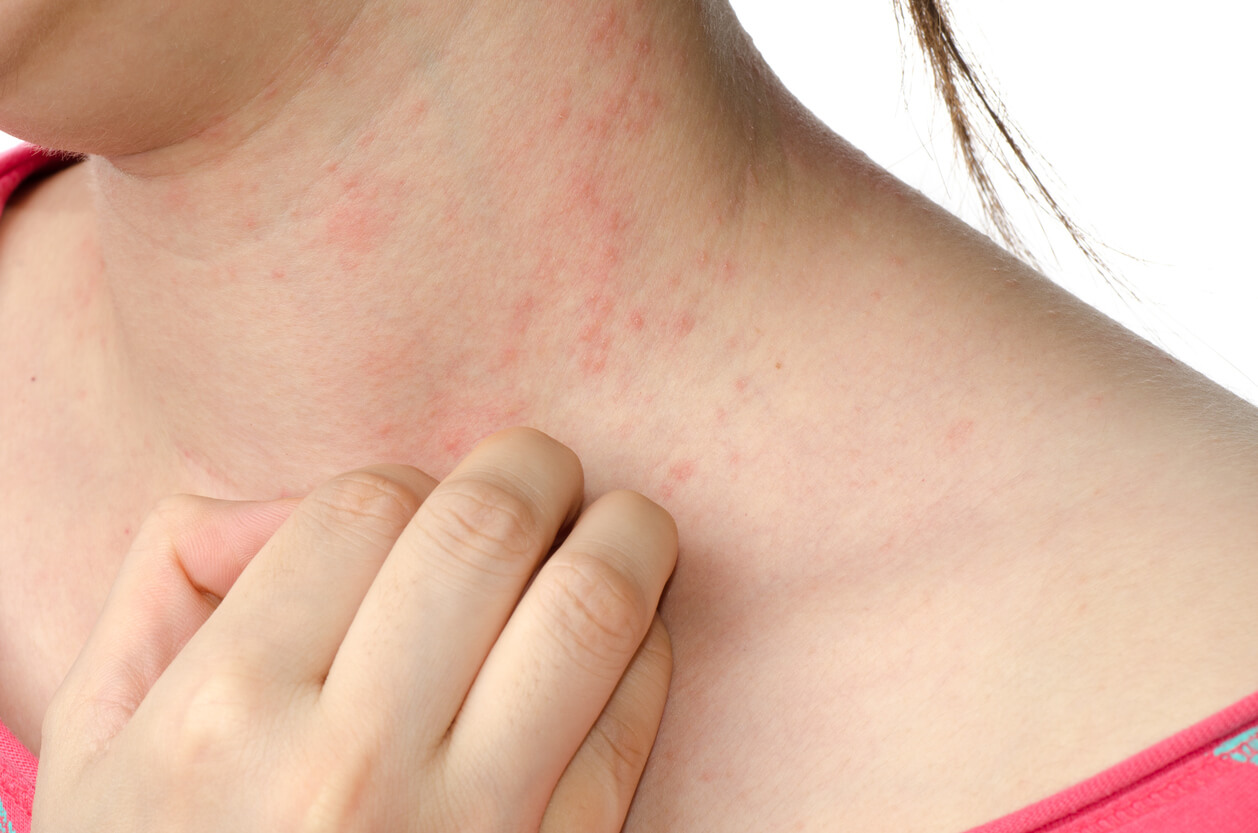While your primary care physician can handle many common and simple skin problems, you may need to see a dermatologist if you have one that covers a significant part of your body, if it may lead to extensive scarring or permanent skin damage, or if you think it signifies a potentially serious underlying medical condition.
If you are experiencing any of the following signs, see a dermatologist for prompt and effective intervention.
Dry, Red, Itchy Skin Patches with Thick, Silvery Scales
Dry, red, itchy patches of skin covered with thick, silvery scales are a symptom of psoriasis, a chronic, complex skin disease requiring specialized care. Psoriasis goes through cycles: it flares for weeks or months, then subsides for a while, or goes into remission.
There is no known cure for psoriasis, and treatment is aimed at mitigating the symptoms by preventing skin cells from growing rapidly and removing the scales. Your dermatologist may recommend a combination of treatment approaches to effectively manage your symptoms.
Suspicious Skin Changes
See a dermatologist if you notice any unusual skin changes, such as suspicious moles. This easy mnemonic will help you detect signs of skin cancer.
- Asymmetry– Half of your mole is not looking consistent as the other.
- Border– Your mole has uneven, scalloped, or notched edges.
- Color– Your mole appears varied, having a mixture of shades (e.g., black, brown, and tan).
- Diameter– Your mole is more than 6 mm (1/4 inch) in diameter.
- Evolving– Your mole is bleeding, changing, or growing.
Your dermatologist will do a thorough evaluation and recommend the most suitable treatment option for you. Depending on their findings, your dermatologist may recommend Mohs Micrographic Surgery— an outpatient procedure that involves progressively removing the thin layers of cancer-containing skin and examining them until your doctor is certain that only the cancer-free tissue is left. This ensures minimal damage to the healthy tissue around the area.
Cracked, Inflamed, Itchy, Red Skin
Dry, red, and itchy skin may be a sign of eczema (atopic dermatitis). Though more common in children, eczema can occur at any age.
Eczema can develop anywhere on the body but is more common on the hands, wrists, feet, ankles, neck, upper chest, eyelids, inner elbows, and the backs of knees.
Many factors can exacerbate symptoms of eczema. These include skin dryness, stress, sweat, scratching, and harsh skin products.
Treatments can vary depending on the location and severity of your eczema but will likely include oral and topical corticosteroids. Your dermatologist may also prescribe antibiotics if your skin has become broken or cracked, which could increase your risk of developing a bacterial infection.
Large, Inflamed, Painful, Pus-Filled Breakouts
Large, painful, pus-filled nodules are a symptom of nodular acne (a severe form of acne). There are a number of factors that trigger the formation of nodular acne. These include overactive sebaceous glands, an overgrowth of bacteria, and an abnormal buildup of dead skin cells.
Your dermatologist may recommend a combination of treatments, such as oral or topical antibiotics, other types of prescription medications, and laser treatments to treat the infection and address scarring.
Trusted Dermatologist in Athens, Winder, Lake Oconee, Elberton, and Commerce, Georgia
At Georgia Skin Cancer & Aesthetic Dermatology, our board-certified dermatologists combine their expertise with sophisticated technology to address the full range of skin conditions—including eczema, psoriasis, acne, and skin cancer. We also offer a vast array of aesthetic dermatology services, helping scores of patients throughout the state of Georgia look and feel their best.
To schedule a consultation with one of our dermatologists, call us today at (706) 543-5858 or use our convenient online Book Appointment form.
